Related Research Articles

The hepatopancreas, digestive gland or midgut gland is an organ of the digestive tract of arthropods and molluscs. It provides the functions which in mammals are provided separately by the liver and pancreas, including the production of digestive enzymes, and absorption of digested food.

Elysia is a genus of sea slugs, marine gastropod molluscs in the family Plakobranchidae. These animals are colorful sea slugs, and they can superficially resemble nudibranchs, but are not very closely related to them. Instead they are sacoglossans, commonly known as sap-sucking slugs.
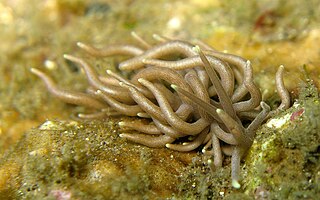
Phyllodesmium briareum is a species of sea slug, an aeolid nudibranch, a marine gastropod mollusc in the family Facelinidae.

Phyllodesmium is a genus of predatory sea slugs, aeolid nudibranchs, marine gastropod molluscs in the family Facelinidae.

Phyllodesmium longicirrum, common name the solar-powered phyllodesmium, is a species of sea slug, an aeolid nudibranch, a marine gastropod mollusc in the family Facelinidae.

Phyllodesmium crypticum is a species of sea slug, an aeolid nudibranch, a marine gastropod mollusc in the family Facelinidae.
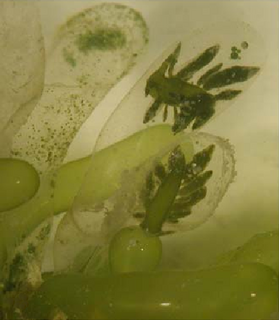
Ercolania is a genus of small sacoglossan sea slugs, shell-less marine opisthobranch gastropod mollusks in the family Limapontiidae.

Phyllodesmium rudmani is a species of sea slug, an aeolid nudibranch, a marine gastropod mollusc in the family Facelinidae.

Phyllodesmium colemani is a species of sea slug, an aeolid nudibranch, a marine gastropod mollusc in the family Facelinidae.
Phyllodesmium hyalinum is a species of sea slug, an aeolid nudibranch, a marine gastropod mollusc in the family Facelinidae.

Phyllodesmium iriomotense is a species of sea slug, an aeolid nudibranch, a marine gastropod mollusc in the family Facelinidae.
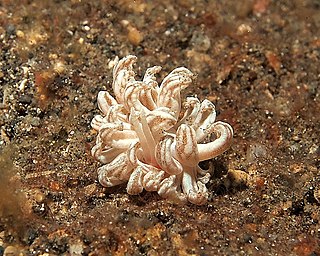
Phyllodesmium jakobsenae is a species of sea slug, an aolid nudibranch, a marine gastropod mollusk in the family Facelinidae.

Phyllodesmium macphersonae is a species of sea slug, an aeolid nudibranch, a marine gastropod mollusc in the family Facelinidae.

Phyllodesmium magnum is a species of sea slug, an aeolid nudibranch, a marine gastropod mollusc in the family Facelinidae.

Phyllodesmium opalescens is a species of sea slug, an aeolid nudibranch, a marine gastropod mollusc in the family Facelinidae.
Phyllodesmium parangatum is a species of sea slug, an aeolid nudibranch, a marine gastropod mollusc in the family Facelinidae.
Phyllodesmium acanthorhinum is a species of sea slugs, an aeolid nudibranch, a marine gastropod mollusc in the family Facelinidae.
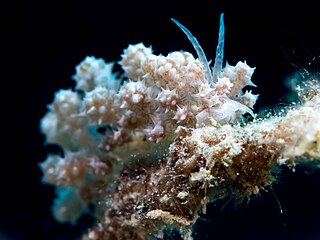
Phyllodesmium koehleri is a species of sea slug, an aeolid nudibranch, a marine gastropod mollusc in the family Facelinidae.

Phyllodesmium lizardense is a species of sea slug, an aeolid nudibranch, a marine gastropod mollusc in the family Facelinidae.
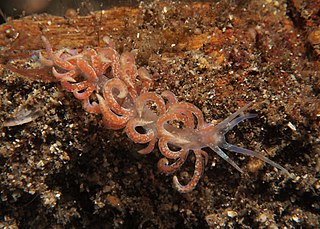
Phyllodesmium poindimiei is an Alcyonacea feeding, aeolid nudibranch Gastropod belonging to the family Facelinidae. Cerata are important in this clade in terms of their physical defense and efficient metabolic processes.This species is spread sporadically along tropical coastal regions such as Australia, Hawaii, and the Indo-Pacific living in diverse marine habitats such as coral reefs. Unlike other species in the Opisthobranch Mollusca clade, P. poindimiei’s lush pink cerata are used for defensive purposes other than Nematocyst (dinoflagellate) capture and toxin release. Organismal ties within these thriving, tropical ecosystems can be determinants of environment change, which affects massive coral ecosystems. Continuously changing marine ecosystems, such as coral reefs, are directly linked to the evolution of organisms that live and thrive in the tropics such as the soft nudibrach P. poindimiei.
References
- ↑ Burghardt, I., Schroedl, M. & Wagele, H. 2008. Three new solar-powered species of the genus Phyllodesmium Ehrenberg, 1831 (Mollusca: Nudibranchia: Aeolidioidea) from the tropical Indo-pacific, with analysis of their photosynthetic activity and notes on biology. Journal of Molluscan Studies, 74: 277-292.
- ↑ Bouchet, P. (2015). Phyllodesmium lembehense. In: MolluscaBase (2015). Accessed through: World Register of Marine Species on 2015-10-06
- ↑ Rudman, W.B., 2008 (August 29) Phyllodesmium lembehense Burghardt, Schroedl & Wagele, 2008. [In] Sea Slug Forum. Australian Museum, Sydney.